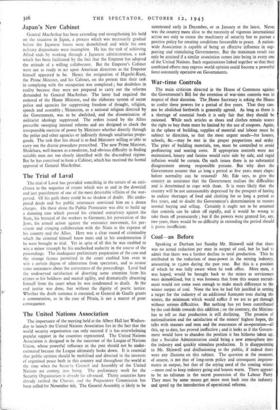War-time Controls
The main criticism directed in the House of Commons against the Government's Bill for the retention of war-time controls was in respect of their duration. The Home Secretary is asking the House to confer these powers for a period of five years. That they can- not be abolished forthwith is generally agreed. As long as there is a shortage of essential foods it is only fair that they should be rationed. While such articles as shoes and clothes remain scarce the right to buy them must be limited by the use of coupons. Again, in the sphere of building, supplies of material and labour must be subject to direction, so that the most urgent needs—for houses, schools, &c.—may be met in the proper proportions and order. The price of building materials, too, must be controlled to avoid profiteering and soaring costs. If appropriate controls were not maintained, luxury and famine would exist side by side, and rapid inflation would be certain. On such issues there is no substantial disagreement among responsible persons. But why does the Government assume that so long a period as five years must elapse before normality can be restored? Mr. Ede says, to give the country an assurance that the Government realises the difficulties and is determined to cope with them. It is more likely that the country will be not unreasonably depressed by the prospect of having to endure shortages of food and clothing for so long a period as five years, and to doubt the Government's determination to restore normal buying and selling. Certainly it ought not to be assumed that controls can be taken off rapidly, and it would be wrong to take them off prematurely ; but if the powers were granted for, say, two years, there would be no difficulty in extending the period should it prove insufficient.


























 Previous page
Previous page